- Home
- Susan Squires
Sacrament
Sacrament Read online
SACRAMENT
By
Susan Squires
Contents
Chapter One
Chapter Two
Chapter Three
Chapter Four
Chapter Five
Chapter Six
Chapter Seven
Chapter Eight
Chapter Nine
Chapter Ten
Chapter Eleven
Chapter Twelve
Chapter Thirteen
Chapter Fourteen
Chapter Fifteen
Chapter Sixteen
Chapter Seventeen
Chapter Eighteen
Chapter Nineteen
Chapter Twenty
Chapter Twenty-one
Chapter Twenty-two
Praise for Susan Squires,
2001 Golden Heart Award Winner
Danegeld
"An outstanding debut novel that takes some risks and succeeds. Susan Squires gives us a gritty, complex love story that is as engrossing as it is endearing."
—The Romance Reader
"Bravo Susan Squires! If we let this wonderful, original book fall by the wayside, we will be stuck with cookie-cutter books and will have only ourselves to blame."
—All About Romance
"A competent and well-thought-out historical novel, with just a bit of magic thrown in for delicious spice.
Brava, Ms. Squires!"
—Old Book Barn Gazette
A Perilous Companion
Sarah's attention returned to Davinoff. She had never met a man who knew so much about the land, about what had happened here. They made their way back into the tavern in silence. There, Davinoff went to pay their shot.
The landlord was busy smoothing a paper over the bar, a copy of the crude line drawing the strange witness to the murders in London had made. He came out from behind the bar and pushed the sheet upon a nail next to the hearth, the lettering on the parchment proclaiming that the man in the sketch was wanted. There was a reward of a thousand guineas. Sarah shuddered. From the instant she'd first seen it, the drawing reminded her of Davinoff.
He clinked coins on the table behind her. He, too, was examining the portrait. "You are right," his deep voice rumbled almost in her ear. "It could be anyone. Even me." She turned, and he raised one eyebrow in a gesture she was coming to know too well. His eyes were dark, darker than any she'd ever seen. "Shall we get on the road?" he asked.
Sarah's heart throbbed against her chest. He was right. The drawing could be anyone. But was it? She couldn't put her question into words, but he must have seen it in her face.
"I thought you hated to spoil mysteries," he chided, and strode out to the curricle.
Other Love Spell books by Susan Squires:
DANEGELD
SACRAMENT
Susan
Squires
LOVE SPELL BOOKS NEW YORK CITY
To Harry,
who first read a Georgette Heyer novel to me,
who pushed me into writing,
who believed in this story from the start,
and who was my critique partner throughout its gestation.
This book is as much yours as it is mine.
A LOVE SPELL BOOK®
March 2002
Published by
Dorchester Publishing Co., Inc.
276 Fifth Avenue
New York, NY 10001
Copyright © 2002 by Susan Squires
ISBN 0-505-52472-4
The name "Love Spell" and its logo are trademarks of Dorchester Publishing Co., Inc.
Printed in the United States of America.
Visit us on the web at www.dorchesterpub.com.
Sacrament
Chapter One
^ »
To Sarah Ashton, Lady Clevancy, chaos seemed to swirl in the damp night like leaves in the wind. The last place she wanted to be this evening was locked in a carriage with George and his mother. Huddling into the musty squabs of red velvet as the Beldons' lumbering barouche inched through the crush of carriages converging on Carlton House, she shivered. It might have been because of the chill in the spitting October air. It might have been because her life was unraveling.
"I don't care what you say, Sarah," Lady Beldon remonstrated for the hundredth time, pulling her lap rug more securely over her knees. "These dreadful murders strike fear into one's heart." The many ostrich feathers on her massive aubergine turban shivered in dread.
Sarah didn't care about the murders. She had come to London to see Mr. Lestrom, her solicitor. She would have seen him today, but the coach had lost a wheel on their way into London from Bath. The letter from Lestrom's son, its crumpled pages now carefully refolded inside her reticule, must be a mistake. How could there be a challenge to her ownership of Clershing? She had just paid off the debt her father left when he died, finally almost escaped her genteel penury. If she lost Clershing, what would she do? The house in Laura Place would go as well with nothing to support it. Amelia, the servants Addie and Jasco, they depended on her. What would become of them? And of Sarah, herself? Would she become a governess, a housekeeper? She could never take orders from some haughty, thoughtless creature; she'd be sacked within a week.
"George, how can you take your own mother into a metropolis where I am like to be killed at any moment?" Lady Beldon poked her second son's knee with one plump finger.
George Upcott did not even turn from looking out the window. How could he be calm, Sarah wondered, when she thought she might scream at any moment? "If you like," he said, "I shall order John Coachman to turn around."
"But I cannot miss the prince's ball," the dowager almost wailed. "He's opening Carlton House for the first time since the Nash renovations. People are begging for cards. If one were not to go… well, I hardly think one would be considered fashionable at all."
George shrugged. "As you choose." He was a well-made man of medium height, his hair a sandy blond, his eyes translucent gray blue. He was a handsome specimen; everyone told Sarah so. His lips were thin and straight like his nose, his complexion rather wan since he spent most of his waking hours in a laboratory. He was serious and single-minded, a promising man of medicine. All Bath had expected him and Sarah to make a match these three years and more. It should be natural to confide her dilemma to him. It wasn't. He had never approved of her managing her affairs herself with only the aid of dear Mr. Lestrom. If she lost Clershing, George would claim it was her own fault. And if her penury was not even genteel? What would George say then?
"I wouldn't miss being in London now for the world," he remarked, unmindful of his mother's nerves. "I can't for the life of me see how the blood is entirely drained from the victims' bodies. Once the heart stops beating, the blood ceases to flow."
"How can such crimes be committed in the most civilized city in the world eighteen years into the nineteenth century?" Lady Beldon complained.
The coach lurched to a stop. Horses snorted and stamped around them. Coachmen shouted. A young woman shrieked with laughter. Sarah heard the noise only dimly.
What kind of challenge to her ownership was there? Her solicitor's letter gave few details. She had never heard of this dreadful Julien Davinoff who laid claim to her land. Her thoughts stole to her grandfather's disastrous propensity for gambling. Had he lost Clershing gaming? Surely a note of hand so old could not be brought to a court of law. Well, she would never relinquish Clershing without a fight.
Sarah had no desire to go to the prince's ball. She had tried to stay home tonight, pleading that her head ached, but Lady Beldon had insisted. Since Sarah needed the woman's chaperonage to stay in London while she conducted her business, and Lady Beldon required an entourage at every social occasion, Sarah was going to Carlton House, whether she would or no
.
She didn't even have the satisfaction of knowing she looked well. She wore the only dress she owned fit for a ball. The tiny puff sleeves and high waists that were the height of fashion were not always kind to women with voluptuous figures. The dress was rich looking, to be sure, but the cream-colored lace would have been better stark white for Sarah's dark hair, green eyes and pale, almost translucent skin. The cream color pulled the freshness from the lavender satin and muddied it somehow. George had helped her choose it, had insisted on the fabric. The lace tucked modestly into the neck and cascading over the hem was his suggestion, too. The deep rose silk he had so disparaged rose to mind, with a daring Austrian neckline and a black beaded fringe. He was probably right. It would have seemed fast.
"We'll never get there at this rate," Lady Beldon complained.
George finally looked exasperated. He leaned out the window and called for the driver to take an alternate route. The carriage swung into a side street and the going got better. But shortly before Hyde Park Corner the barouche pulled up again amidst the noise of a crowd.
George thrust his head out the window again. "Why are we stopping, John?"
"The way is blocked by a mob, sir," came the answering call.
"Well, push through," George ordered and sank back inside. "What could induce a crowd to gather? Everyone is either locked indoors in terror or on their way to the ball."
"I don't know and I don't care," Lady Beldon declared. "Tell him to hurry, George."
There was nothing to be done, however. The carriage crept into the gathering. Those in the crowd craned their necks to look ahead. The streets were wet and black. Bare branches clicked in the wind. What could all these people be looking at?
As they came to the center of the throng, Sarah began to dread what she might see. Two very official-looking men stood in a pool of light cast by one of the new gas lamps. One held a notebook in which he was writing. The other questioned a beautiful woman, wrapped only in a shawl of Norwich silk over a diaphanous gown, in spite of the chill night. She was red-haired, with wide lips and blue eyes. Sarah was struck by a sly quality in her expression. One would never forget that face. A few feet away a woman lay supine on the cobblestones.
Was this a murder? The body on the cobblestones was very still. Instinctively Sarah put her hand to her mouth. "George," she whispered. He must have come to the same conclusion, for he leapt out of the carriage without a word to his companions and elbowed his way through the crowd, shouting, "I am a doctor, let me through."
"George, don't leave us," Lady Beldon cried. When she saw that she was having no effect on him, she rapped her cane on the inside of the roof and ordered the driver to pull ahead.
Sarah leaned out the window as the barouche pulled up to the barricade. All thoughts of her own predicament seemed instantly insignificant. She didn't want to know what had happened here, yet she could not turn away. Lady Beldon sank back into the cushions with a low moan. George pushed his way through the barricades into the circle of light.
One of the constables, the younger and stockier of the two, blocked George's path to the corpse with a broad shoulder. "This 'ere investigation is official." Sarah strained to hear.
George pulled at his cravat. "Of course. But you must require a physician's opinion."
"We know, what we got 'ere. Same as the other twelve."
George was being dismissed. Sarah realized with a shock that this was one of the murders they called the "vampire killings."
"Are you a fool, man?" George protested. "I'm a specialist in blood transfusion."
"What's that you say?" the stocky one asked, suspicious.
George mastered his impatience enough to snap his reply without actually shouting. "Draining blood out of healthy people into sick ones."
"Then," the thinner constable interrupted in more cultured tones, "we could use your perspective, doctor." He held up a hand against his cohort's protests. "My name is Chaldon, sir, and this is Barnett." He gestured an invitation toward the body. "What do you make of it?"
George pushed past and knelt over the body. Sarah could see a dark stain on the walk. The too-pale countenance had already begun to sink in upon itself without the support of filled capillaries, so the body had a shrunken look. Even Sarah knew that its blood had been drained. Her mouth went dry. She couldn't look away from the dead woman's staring eyes. George didn't seem perturbed at all. He turned her chin. She wasn't stiff.
"Well, what do you think?" the constable named Chaldon asked. His voice almost trembled.
"I see no possibility that these two small puncture wounds could account for this woman's death," George pronounced, wiping his hands as he rose to his feet. "So much blood could not be drained, even using my new invention. I call it a syringe," he added.
The two policeman exchanged disappointed glances.
"Is this how the other bodies were found?" George asked.
"Aye," Barnett answered. " 'Cept one where the throat was just ripped open, like by an animal, maybe. He bled to death more natural-like." Sarah was shocked; this fellow thought bleeding to death was natural.
"Can you think of no way someone could drain the blood?" Chaldon pressed.
"Well"—George rubbed his chin—"perhaps if there were some sort of pump connected to the syringe to create a greater suction…"
"You sound as if you have the beginnings of a theory, Doctor."
Chaldon encouraged. "May we prevail upon you to come down to the magistrate's office in Bow Street tomorrow? We are quite anxious to learn how these murders were accomplished." He paused and looked down at the corpse. "If we know how it was done, we are one step closer to catching this madman."
George gave a gratified smile. "I shall place myself at the magistrate's disposal."
"May I go?" The red-haired woman the constables had been questioning broke in upon their contemplation of the body. Sarah had almost forgotten her. Now all eyes turned her way. Her ruby lips were fascinating. Her flaming hair gleamed.
"Well, miss, since you have seen his face and can identify our murderer, it might be best for your own safety if you came with us." To Sarah's surprise, the girl chuckled.
"I am enough safe. There are never two deaths in one night, yes?" She had an accent. Continental. Germanic?
"Never been a witness before," Barnett rejoined.
"You saw the murder?" George asked. His gaze was rapt upon her. "How was it done?"
"I cannot say," the woman replied as the fingers of the chill evening breeze caressed her hair. "I saw the man's face. I heard the girl scream. But while the deed was done his back was turned. His cape covered all. Me, I hid myself in the shadows. But I have told all this."
This woman should be frightened, Sarah thought. Death had barely passed her by tonight. And you should want to take her hand and soothe her, Sarah told herself, reassure her. Instead she shuddered when those cold blue eyes scanned the crowd.
"Even drew us a pi'ture." Barnett waved a page of his notebook. The drawing was a few lines merely, but evocative. "Tall, well made, dark 'air, dark eyes, 'igh cheekbones, dressed in an evening cape," Barnett recited.
"With your kind description, we will set the Runners out to comb the city and beyond. He cannot escape." Chaldon apparently felt he needed to reassure the cold-eyed woman with lies. She hardly seemed to need it. And they were lies. Hundreds fit the description she'd given.
Barnett looked up from his notebook. "You sure that's all, are you?"
"Really, gentlemen, no more. I will go home now."
And they let her, in spite of the danger, in spite of their questions. Sarah couldn't believe it. They all looked into her eyes as though they had been turned to stone and watched the only witness in a string of grisly murders walk off alone.
Sarah put her hand to her forehead. The whole scene was like a play revealed by the garish glow of the street lamps, the emotions stirred yet drifting in the wet air. George, the officers, and the beautiful woman were actors on a stag
e at the denouement. The climax done, they played out their parts by rote, flattened by the light. The people who pushed and shoved for a better view of the tragedy were a dim chorus, a surge of humanity in the darkness between the lamps.
George came to himself. "I say, I hope you know where to find her."
"Course we do." Barnett shook his head. "Bristol Court, off Dean Street." He flipped through his notebook to read the address.
Chaldon snatched the notebook from him. "Did you say Bristol Court?" The two constables looked at each other for a long moment, surprise and then dismay crossing their faces in turn.
"What is it?" George asked.
Chaldon snapped the notebook shut and tossed it to Barnett in disgust. "There is no such address off Dean Street."
George returned to the carriage. Looking smug, he swung into the seat next to his mother and patted her hand. As the coach inched away Sarah sat forward and craned to see the constables still standing over the body. She couldn't relinquish her awful fascination.
A countenance in the gloom at the edge of the crowd jerked Sarah back. The man was tall, well made, with dark eyes, arched brows and high cheekbones, with sensuous, curving lips and wild black hair against pale skin. A cape swirled about him. The evocative lines of the red-haired witness's drawing flashed into Sarah's brain. Could this be the man who had murdered here tonight? His eyes burned as he surveyed the scene. They were hard, unforgiving. He had seen everything, forgotten nothing, and he was obviously angry. The crowd shrank back from him. He seemed to float in his own space. Sarah strained to see, leaning over to press her breasts against the door of the coach. He was beautiful, she thought, but like the forces of disorder, he lurked at the edge of the tenuous circles of light. This man could kill; she was sure of it. She shuddered. Be sensible. Your mood is coloring your thoughts. But she could not look away from that face. Was it fear that wound its way into her heart, or fascination? Before she could decide, his cape swirled and the man disappeared into the darkness.

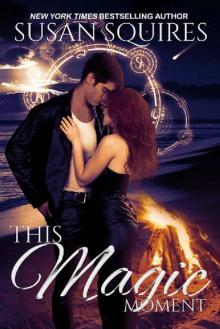 This Magic Moment
This Magic Moment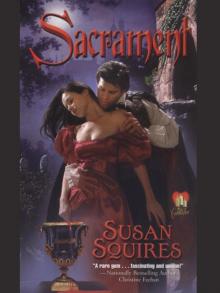 Sacrament
Sacrament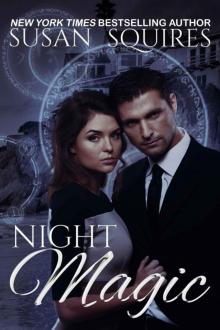 Night Magic
Night Magic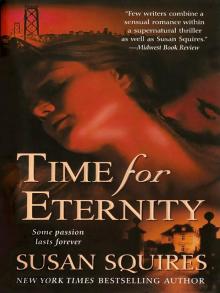 Time for Eternity
Time for Eternity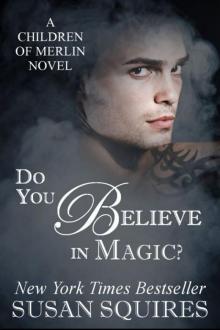 01 Do You Believe in Magic - The Children of Merlin
01 Do You Believe in Magic - The Children of Merlin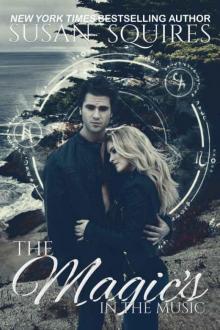 The Magic's in the Music (Magic Series Book 5)
The Magic's in the Music (Magic Series Book 5)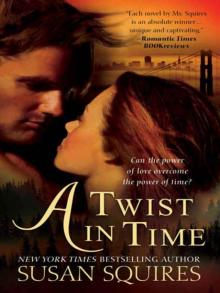 A Twist in Time
A Twist in Time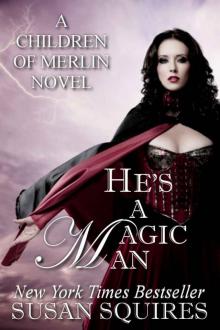 He's A Magic Man (The Children of Merlin)
He's A Magic Man (The Children of Merlin)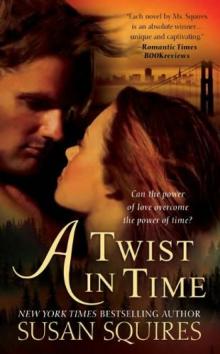 A Twist in Time dvtt-3
A Twist in Time dvtt-3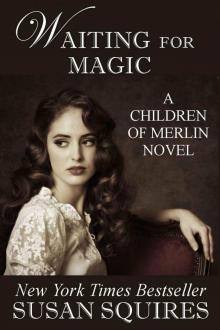 Waiting for Magic
Waiting for Magic